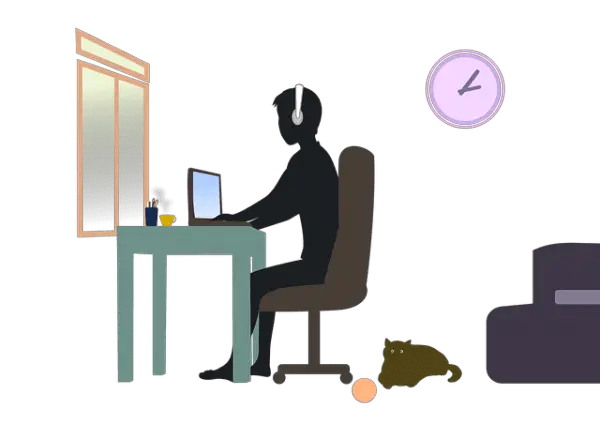If you enjoy working in a fast-paced and challenging environment, then becoming a dispatcher from home can be a rewarding career choice for you. With the rise of technology and remote work options, more and more dispatching positions are becoming available for individuals who want to work from home.
Dispatchers play a crucial role in ensuring that the day-to-day operations of various industries, such as transportation, emergency services, and logistics, run smoothly. If you’re interested in pursuing a career as a dispatcher from home, you’ve come to the right place.
In this blog, we’ll explore the steps you need to take to become a dispatcher from home, including the skills and qualifications you’ll need, the equipment required, and the industries that offer remote dispatching opportunities. So, let’s dive in and find out how you can become a successful dispatcher from the comfort of your own home.
How to Become a Dispatcher From Home
Becoming a dispatcher from home is possible, but it will depend on the specific type of dispatching you are interested in. Here are some steps you can take to become a dispatcher from home:
1. Research the requirements
When researching the requirements for becoming a dispatcher from home, it’s important to first determine the specific type of dispatching you are interested in. Different types of dispatching require different skills, education, and experience. We have highlighted some different types of dispatching to help you decide which is best for your career.
- Transportation Dispatching: If you are interested in transportation dispatching, you may need to know transportation regulations, logistics, and routing. You may also need a commercial driver’s license (CDL) or experience in the transportation industry.
- Emergency Services Dispatching: For emergency services dispatching, you may need to know emergency protocols, medical terminology, and geography. You may also need to complete training courses and certification programs.
- Security Dispatching: Security dispatching may require knowledge of security protocols, access control systems, and surveillance technologies. You may also need to have experience in the security industry or law enforcement.
- Utility Dispatching: Utility dispatching may require knowledge of utility systems, maintenance procedures, and safety protocols. You may also need to have experience in the utility industry.
How to Become an Insurance Agent from Home
2. Get the Necessary Education and Training
Apart from knowing the type of dispatching that will fit your career, it will also be important to get the right education and training that will help you succeed in your job. You can start by looking for certificates, diplomas, or degree programs related to your chosen field. Consider online programs that are flexible and designed for remote learning.
Some programs may be completed entirely online, while others may require in-person or hands-on training. Furthermore, choosing a school or training provider that is reputable and recognized in the industry can give you more accreditations or certifications that are recognized by employers and industry associations.
3. Gain Experience
In addition to formal education and training, you may also need to have some experience to give you an edge over other applicants. Many dispatching jobs require some level of experience, but there are often entry-level positions available that can help you get started. Look for positions that require minimal experience, such as customer service representative or dispatcher assistant. Many people might also consider volunteering or interning with a company or organization in their desired field. With this, you can valuable experiences and connections in the industry. These are the connections you will tap into when you finally start working remotely.
Networking can also help you gain the necessary experience you need to be successful as a dispatch rider from home. When you attend industry events, join professional organizations, and connect with other dispatchers online, you gain a lot from them and these people can also help you in terms of job opportunities and insights into the industry.
4. Create a Home Office
Since you are going to be working remotely, you will need to set up a home office. You need to do this because you need to be as comfortable as you can be without no distractions. Plus, it also helps maintain a healthy work life. To set this up, you need to choose a room or area in your home that can be dedicated solely to your dispatching work. Avoid using shared spaces or areas with lots of distractions.
Choose a comfortable chair, adjust your desk to the right height, and position your computer screen at eye level to reduce strain on your neck and eyes. Also make sure you have the right equipment for the job, including a reliable computer, high-speed internet, a phone line, and any necessary software or hardware.
Top 12 Equipment Needed to Work From Home
Software and Tools to Make Your Job Easy as A Dispatcher from Home
Software and tools are designed to make a lot of work easier, meaning that these tools can make your work a lot better, faster and more efficient. The last three keywords are what your clients are looking for. There is a lot of software out there, but we have narrowed it down based on categories that will suit your job as a dispatcher from home.
1. Dispatch Software
There is numerous dispatch software available on the market, such as TruckingOffice, TruckLogics, and Samsara, which can help you streamline your dispatching process. These software programs typically come with features like GPS tracking, route optimization, real-time data syncing, and automated billing and invoicing.
2. Communication Tools
As a dispatcher, you need to stay in touch with your drivers and clients throughout the day. Communication tools like Skype, Zoom, or Slack can help you keep in touch with your team, share files and information, and collaborate in real time.
3. Mobile Apps
There are many mobile apps available for dispatchers that allow you to manage your fleet and drivers from your smartphone. Apps like Fleetio, KeepTruckin or Motive, and TruckerPath offer features like vehicle inspection, fuel tracking, and real-time GPS tracking.
4. Cloud storage
Cloud storage services like Google Drive, Dropbox, and OneDrive are excellent tools for storing and sharing important documents and data. These services allow you to access files from anywhere, collaborate with others, and share files securely.
5. Time management tools
As a dispatcher, you need to stay organized and manage your time effectively. Tools like Trello, Asana, and Todoist can help you create to-do lists, set reminders, and track your progress on tasks.
Top 11 Productivity App For Remote Workers
How to Look for Job Opportunities as a Dispatcher From Home
Now that you know what to do to start a career as a dispatcher from home, you will have to get a job eventually. Luckily for you, we will show you how to do that in a simple yet effective way.
- Search online: There are many online job boards and websites where you can search for dispatcher positions. Some popular job boards include Indeed, Glassdoor, and LinkedIn.
- Check with companies: Reach out to companies that offer dispatching services and inquire about remote opportunities. Many companies are now offering remote work options to attract talent from all over the country.
- Check with industry-specific associations: Look into industry-specific associations, such as the National Emergency Number Association (NENA) or the Association of Public-Safety Communications Officials (APCO), to find job postings or connect with other dispatchers.
- Reach out to recruiters: Reach out to recruiters who specialize in placing candidates in dispatching positions. These recruiters may have access to job openings that aren’t listed on public job boards.
- Leverage social media: Use social media platforms like Twitter, Facebook, and LinkedIn to network with other dispatchers and stay up-to-date on job openings. You can also use social media to promote your skills and experience to potential employers.
- Prepare a strong resume and cover letter: Make sure you have a strong resume and cover letter that highlights your relevant skills and experience. Tailor your resume and cover letter to each job you apply for.
- Prepare for interviews: Be prepared for interviews by researching the company and industry, preparing answers to common interview questions, and practising your communication skills.
Skills or qualities to become a successful dispatcher from home
In addition to formal education, training and experience, you may also need to have specific skills or qualities to become a successful dispatcher. These may include strong communication skills, the ability to multitask and work well under pressure, and attention to detail. Some employers may also require that you have experience in a related field, such as transportation, emergency services, security, or utilities. We have highlighted some skills below to give you a better understanding of what skills is required.
1. Strong Communication Skills
As a dispatcher, you will need to communicate effectively with drivers, customers, and other team members. You should be able to convey information clearly and concisely and be a good listener.
2. Attention to Detail
Dispatchers need to keep track of multiple schedules and assignments simultaneously and make sure that everything runs smoothly. Paying attention to details can help you avoid errors and ensure that operations run efficiently.
3. Organizational Skills
Effective dispatchers must be able to keep track of numerous tasks and schedules and keep everything organized. Strong organizational skills will help you manage your workload and prioritize tasks effectively.
4. Problem-solving Abilities
As a dispatcher, you will encounter problems and unexpected situations on a regular basis. The ability to think quickly on your feet and come up with creative solutions is essential.
5. Knowledge of Geography
Dispatchers must be familiar with the geography of the areas they are working in, and be able to read and understand maps and directions.
6. Familiarity with Dispatch Software
You will likely be using dispatch software to manage schedules and assignments, so it is important to be familiar with this technology.
7. Ability to Work Independently
Working from home requires discipline and self-motivation. Successful dispatchers must be able to work independently and manage their time effectively.
8. Positive Attitude
Finally, a positive attitude can help you handle the stresses and challenges of the job, and keep a professional demeanor when communicating with drivers and customers.
Conclusion
Becoming a dispatcher from home can be a rewarding career choice for those who enjoy working in a fast-paced and challenging environment. Luckily for you, more dispatching positions are popping up lately for individuals who want to work from home.
With the right training and education, you can learn the skills needed to become a successful dispatcher and find a position that allows you to work from the comfort of your own home. Just be sure to do your research and find a reputable training program or company to work with, so you can start your journey towards a rewarding and fulfilling career as a dispatcher from home.






